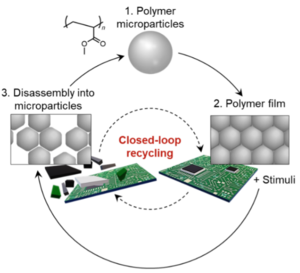Researchers from Shinshu University have developed a closed-loop recycling strategy for polymer microparticles that creates various recycled materials without compromising their properties. The strategy involves preparing uniform spherical poly-MA microparticles via the aqueous emulsion polymerization of methyl acrylate monomers in water, which resulted in polymer chains. The polymer chains then aggregated to form a solution, which was dried to obtain a thin polymer film. The researchers further enhanced the fracture energy of the polymer films by mixing the microparticles with silica nanofillers and colored pigments. The resulting composite films exhibit tunable optical properties, which do not diminish upon recycling. Closed-loop recycling based on polymer microparticles enables resource circulation for polymers and composite materials containing polymer microparticles, thereby reducing plastic waste and potentially solving environmental degradation and plastic pollution. Shinshu University is committed to providing innovative solutions for building a sustainable society through interdisciplinary research fields, such as materials science, biomedical science, and mountain science, and fostering promising creative professionals.
Closed-loop Polymer Recycling: A New Strategy for Complete Recyclability and High Stability
Plastic waste is a growing environmental problem that contributes to pollution and depletes valuable resources. The increase in plastic waste generation worldwide shows that the problem will worsen in the coming years. A significant amount of plastic waste is either incinerated or deposited in landfills, which causes environmental degradation and further resource depletion.
Recycling plastics, especially polymers, offers a sustainable alternative to waste management. However, the process involves breaking the chemical bonds between monomers, which reduces the stability and quality of the polymer. To address this issue, researchers have been exploring closed-loop recycling methods that recycle polymers without compromising their properties. However, the current methods are complex, expensive, and require specialized monomers, which require further innovation.
Recently, researchers led by Associate Professor Daisuke Suzuki from Shinshu University have proposed a new closed-loop recycling process based on polymer microparticles. This process can recycle polymer films composed of polyacrylate-based microparticles by disassembling them into individual microparticles, which can be reassembled to form a film without losing any properties. This process could also be applied to recycle polymer microparticles in composite materials.
According to Prof. Suzuki, their new recycling strategy offers a way to recycle a significant amount of functional polymer materials used in our day-to-day lives without deteriorating their properties. The study has been published in the journal Green Chemistry and offers a promising solution to resource depletion and environmental pollution.
This new polymer recycling strategy ensures both high stability and complete recyclability, making it a promising step towards a circular economy.
Polymer Microparticles: A Closed-Loop Recycling Strategy for Efficient Resource Circulation
Researchers have developed a closed-loop recycling strategy for polymer microparticles, which enables the creation of various recycled materials without compromising their desirable properties. The study, published in the journal Green Chemistry, showcases the potential for efficient and sustainable recycling of polymer materials.
The authors prepared uniform spherical poly-MA microparticles via the aqueous emulsion polymerization of methyl acrylate (MA) monomers in water, which resulted in polymer chains. The polymer chains then aggregated to form a solution, which was dried to obtain a thin polymer film. The films showed high mechanical stability and fracture energy, which is an indicator of their toughness.
The researchers enhanced the fracture energy of the polymer films by mixing the microparticles with silica nanofillers and colored pigments. The resulting composite films exhibit tunable optical properties, which do not diminish upon recycling.
The closed-loop recycling strategy of polymer microparticles enables resource circulation for polymers and composite materials containing polymer microparticles, thereby reducing plastic waste and potentially solving environmental degradation and plastic pollution.
The study highlights the future potential of the new recycling strategy, paving the way for the production of fully recyclable films with high fracture energy. The closed-loop recycling strategy certainly opens new doors for the efficient and sustainable recycling of polymer materials.
Shinshu University: Fostering Innovation for a Sustainable Tomorrow
Founded in 1949, Shinshu University is a national university located in Nagano, Japan, known for its beautiful natural landscapes. The university’s mission is to foster promising creative professionals and deepen its collaborative relationship with local communities to contribute to regional development through innovation in various fields.
Shinshu University aims to provide solutions for building a sustainable society through interdisciplinary research fields such as materials science, biomedical science, and mountain science. The university is committed to boosting research and innovation capability through collaborative projects with distinguished researchers from across the world.
For more information about Shinshu University and its latest news, visit their website and follow them on Twitter.
Don’t miss interesting posts on Famousbio

